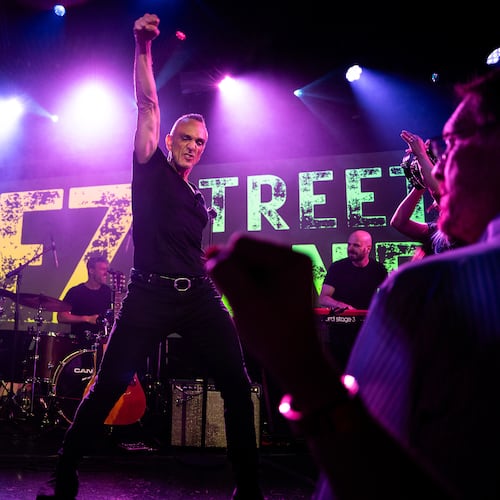This was originally posted Friday, April 14, 2017 by Rodney Ho/rho@ajc.com on his AJC Radio & TV Talk blog
Before Netflix's dramatization "Narcos" came out, Javier Pena and Steve Murphy - the DEA agents who helped capture Columbian drug kingpin Pablo Escobar in 1993 - would make a few presentations for police groups and charities for free.
But since season one of "Narcos" came out in 2015, their phones have not stopped ringing. They are now telling their stories in churches, theaters and law enforcement conventions all over the world on multiple continents. They stop at the City Winery on April 21.
"We did 75 presentations last year and are set to do more this year," Murphy said recently in an interview with his former partner. And he has zero complaints repeating the same anecdotes and observations over and over: "You know cops like to drink beer and tell war stories!"
Besides, he said, "when you start getting bored, you look at your checkbook."
Last year, the pair spoke at the University of Georgia, Suntrust Bank corporate headquarters and Metropol, which represents the executive staffs of local police agencies. Their itinerary this year includes several Scandinavian countries, Latvia, Dubai, Australia, New Zealand, the Netherlands and Scotland.
"It's like a dream retirement," Murphy said. "And it gives us an opportunity to continue to preach our anti-drug message. We're public servants. We don't know how to do a whole lot of other things."
The story of Escobar's rise and fall was as fascinating and exciting as was shown on "Narcos," both men said. Sure, the producers took plenty of creative liberties but as Pena said, "they followed the general timeline of what happened." Plus, the detail they went to make it look authentic, he said, was impressive.
Both said the actors who portrayed them - Boyd Holbrook for Murphy and Pedro Pascal for Pena - did a great job.
"Pedro understood my part," Pena said. "I told him that we were guests of the Colombian National Police. We were there as liaisons. We were never the ugly Americans working abroad. They captured him."
To give them more grit, the script had them cursing a heck of a lot more than they remember doing. "We weren't saints with our language, but we didn't curse that much," Murphy said. "Holy cow!" Plus, their characters smoked cigarettes. Murphy and Pena did not. "It's Hollywood," he said.
For fans, Pena added, the show has built "a cult-like following, like 'Scarface.' '"
Over the years, producers have pitched them film ideas but nothing clicked. When producer Eric Newman approached them in 2013, Murphy said "we tried to blow them off." But they found out Newman ("Children of Men," "Dawn of the Dead") was credible and gave him two hours of their time. "We just hit it off," Murphy said.
He assured the two DEA agents that the series would humanize Escobar but not in any way glorify what he did or go out of their way to justify his actions. "He lived up to his word," Murphy said.
They retired and became consultants for the first two seasons of "Narcos."
Escobar, Pena said, fashioned himself to be a Robin Hood, providing services and gifts to Medellin's poor. "He used them in the end," Pena said. "He used them for favors."
He was driven by both pride, greed and power. He became richer than almost anybody on Earth, yet he always wanted more. Even after he was imprisoned and given a modest sentence, he screwed things up by killing a couple of guys he thought were cheating him out of money, Pena said. "He was true evil. He didn't hesitate to kill people and their families."
The third and fourth seasons of "Narcos" will continue on after Escobar's death as new players take over the drug trade. Murphy and Pena are no longer paid consultants for the project since their characters are no longer focal points post Escobar.
Murphy himself was stationed in Atlanta twice for a collective six years, from 1998 to 2001 and 2006 through 2009. Both times, he was part of multi-agency efforts to stem the drug trade, which has always been healthy in Atlanta.
"I had full intention of retiring here," he said, but he was offered a high-level administrative position in Washington D.C., which he took for four years until he retired in 2013.
Atlanta today, he said, is still a major drug hub for heroin, opiates, cocaine and meth. And with pressures on doctors to cut back on pill prescriptions, people are turning to the streets. In Texas, where Pena lives, heroin and synthetic opiates like Fentanyl are coming in through Mexico.
"The United States is the biggest demander of illegal narcotics in the world," Murphy said. "As long as someone wants it, there's somebody evil enough to supply it."
TALK PREVIEW
"Capturing Pablo: An Evening With Javier Pena and Steve Murphy"
8 p.m., April 21
$30-$40
City Winery Atlanta
650 North Ave., Ponce City Market, Atlanta
Credit: Rodney Ho
Credit: Rodney Ho
Credit: Rodney Ho
Credit: Rodney Ho
About the Author
Keep Reading
The Latest
Featured






